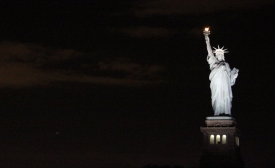u.s.
Conventional news organizations follow a simple protocol in pursuing this week’s WikiLeaks dump of alleged CIA documents about tools to hack into computers, smartphones and the like. Just open up the documents, read them, consult with experts and perhaps write up an article or two. That process doesn’t proceed quite as smoothly at the Voice of America (VOA), the government-funded news outlet that launched in 1942 “to combat Nazi propaganda with accurate and unbiased news and information.”

Markos Kounalakis argues that Cuba played an important and overlooked role in the 2016 presidential election.
According to a survey of 2,000 consumers across China in late February of this year, Donald Trump has caused an adverse effect on Chinese sentiment towards investing in the United States. The data found that 41.2% of Chinese consumers have a more negative view of the US following Trump’s first month as President. 50.7% of consumers held a neutral position and 8.1% now viewed the US more positively.

As the Trump Administration marks the completion of its first 100 days, Mark Dillen's analysis of the crisis in America's place in the world remains as relevant as ever.
Donald Trump was a master at branding in his business career, but he seems to have left those skills in New York. In just a month in Washington, the president has significantly damaged the American brand abroad, in ways that could harm U.S. interests for years. America is not perfect in the eyes of the world. But it is different — and it is seen to be different. Since President Woodrow Wilson framed our entry into World War I as necessary to make the world safe for democracy, American leadership in advancing democratic ideals and global prosperity has been second to none.
This week began with reports that President Donald Trump’s budget proposal will drastically slash the State Department’s funding, and last week ended with White House adviser and former Breitbart head Stephen Bannon telling the attendees of the annual Conservative Political Action Conference that what he and the new president were after was a “deconstruction of the administrative state.” At the State Department, which employs nearly 70,000 people around the world, that deconstruction is already well underway.







